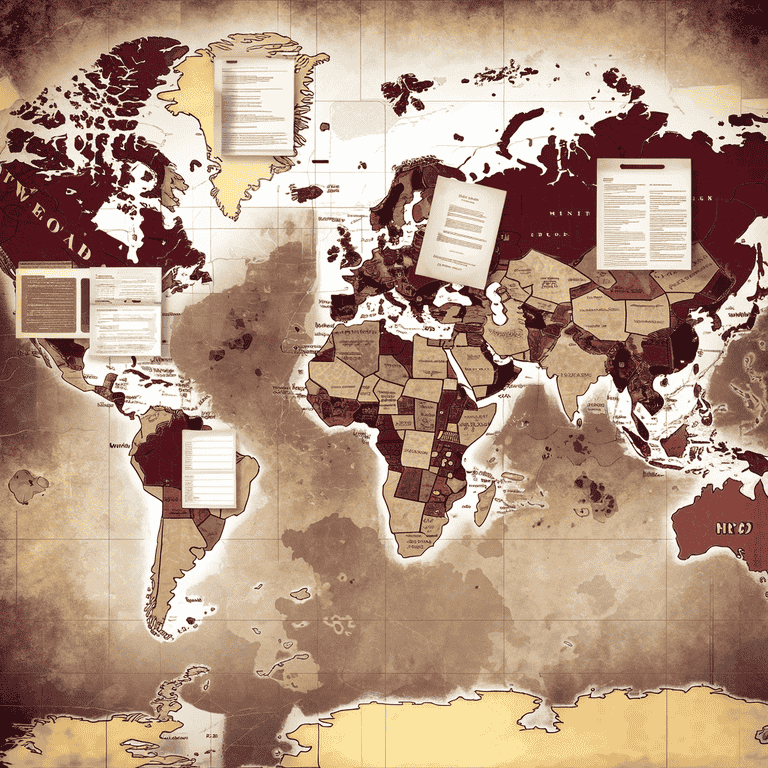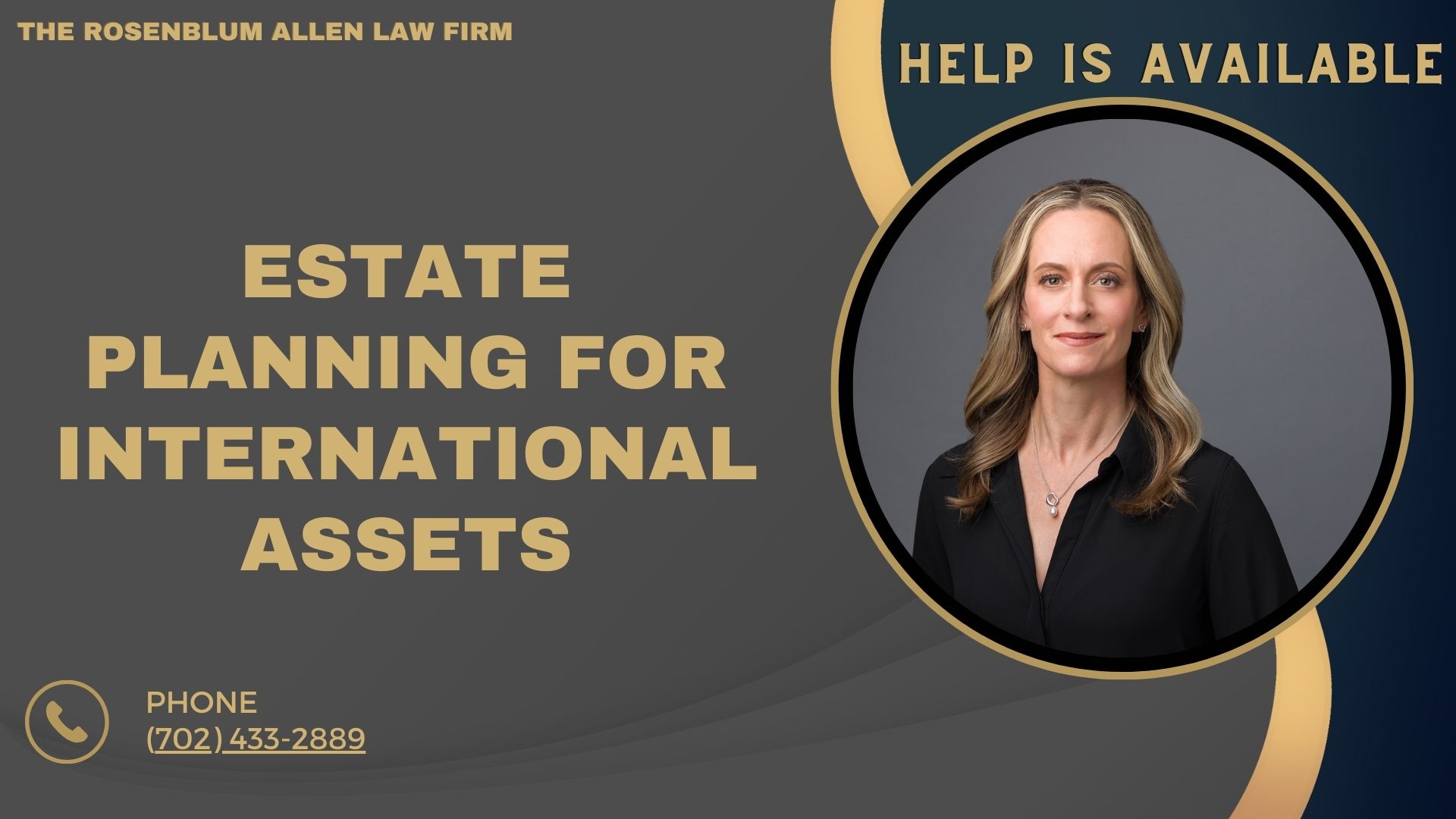Estate planning is a vital process for anyone with assets in multiple countries. It ensures your assets are protected and distributed according to your wishes while minimizing tax liabilities and legal complications. For individuals with international assets, the complexity is heightened due to varying laws and regulations in different jurisdictions. Below, we’ll explore key aspects of estate planning for international assets to help you navigate this critical process.
Understanding the Basics of Estate Planning
Estate planning involves preparing for the management and distribution of assets during life and after death. It includes creating legal documents, such as wills and trusts, to guide allocating assets. Additional steps are needed for individuals with international assets to address cross-border concerns.
Key Considerations for Estate Planning with International Assets
Estate planning for international assets requires careful attention to various factors, including tax implications, jurisdictional differences, and the complexity of managing assets in different countries.
Estate Tax Implications
Individuals may face multiple estate tax liabilities when dealing with international assets, depending on the countries involved. Some countries have higher estate taxes, while others offer favorable tax treaties to minimize double taxation.
- United States: Imposes estate tax on worldwide assets if the estate exceeds the exemption limit.
- United Kingdom: Provides exemptions for certain family members and benefits from tax treaties with many nations.
- France: Applies estate taxes based on the relationship between beneficiaries and the deceased.
Jurisdictional Issues
Each country has distinct rules regarding inheritance, wills, trusts, and probate processes. With proper planning, assets may avoid unnecessary delays, high costs, or disputes.
| Country | Inheritance Laws | Probate Process |
|---|---|---|
| USA | Common law system | Courts oversee |
| Germany | Civil law system | Extensive paperwork |
| Australia | Both common and civil law | Varies by state |
Wills and Trusts
Creating a comprehensive will and utilizing trusts are essential for individuals with international assets to ensure your wishes are carried out efficiently across borders.
Creating a Comprehensive Will
A will is a legal document specifying how your assets should be distributed upon passing. However, for international assets, a standard may not be enough to address the complexities of multiple jurisdictions.
- Primary Purpose: Directs the distribution of assets according to your wishes.
- Complexity: Requires additional considerations when dealing with assets in different countries.
Key Elements of an International Will
- Identification of Assets: Clearly state all assets held in different countries.
- Executor: Appoint an executor who can handle international matters.
- Conflict of Laws: Consider the laws of each jurisdiction to avoid conflicts.
Using Trusts for International Assets
Trusts are flexible tools that can help manage and protect international assets. They offer privacy, avoid probate, and provide greater control over how and when assets are distributed.
- Revocable vs. Irrevocable Trusts:
- Revocable: Can be changed or dissolved during your lifetime. It helps maintain flexibility.
- Irrevocable: This cannot be altered once established, offering asset protection benefits.

Types of Trusts for International Planning
- Living Trust: Manages assets during your lifetime.
- Testamentary Trust: Created upon your passing, according to instructions in the will.
- Foreign Trust: Specifically designed for managing assets across borders.
Power of Attorney and Healthcare Directives
Establishing power of attorney and healthcare directives, in addition to wills and trusts, ensures that your wishes are respected even if you are incapacitated.
Importance of Power of Attorney for International Assets
A power of attorney allows someone else to make decisions on your behalf, including managing international assets.
- Types of Power of Attorney:
- General: Covers financial and legal matters.
- Special: Limited to specific tasks, such as handling international bank accounts.
Healthcare Directives for Cross-Border Situations
Healthcare directives ensure your medical decisions are made according to your wishes, even when abroad.
- Advance Healthcare Directive: Specifies how medical care should be provided if you cannot make decisions.
Avoiding Double Taxation
One of the biggest challenges in estate planning for international assets is avoiding double taxation, which occurs when assets are subject to taxes in more than one country.
Understanding Double Taxation
Double taxation occurs when an individual’s assets are taxed in the country where they reside and in another country where assets are held.
Common Scenarios of Double Taxation
- Real Estate: Owned properties in different countries can be taxed locally and in the country of residence.
- Financial Accounts: Bank accounts and investments held abroad may be subject to taxation in both jurisdictions.
Tax Treaties and Estate Planning
Many countries have tax treaties with other nations to minimize double taxation, which provides relief mechanisms.
- Example: The U.S. and France have a tax treaty that limits double taxation on estates by allowing foreign tax credits and deductions.
Steps to Minimize Double Taxation
- Utilize Tax Treaties: Understand how treaties affect asset distribution and taxation.
- Form Trusts: Irrevocable trusts can shield assets from certain tax liabilities in multiple jurisdictions.
- Legal Advice: Collaborating with international estate planners ensures compliance with local tax laws.

Establishing a Legal Framework for International Assets
Effective estate planning for international assets requires creating a robust legal framework that accommodates the nuances of multiple jurisdictions.
Selecting the Right Legal Team
Working with legal professionals specializing in international estate planning ensures that all legal complexities are addressed.
- Roles of Legal Professionals:
- International Estate Lawyer: Focuses on cross-border asset management.
- Accountant: Provides insight into tax structures and compliance.
- Financial Advisor: Assists in managing wealth across borders.
Regularly Updating Your Estate Plan
Estate planning is not a one-time process. With changing laws and asset circumstances, regular updates are essential.
- Life Events: Marriage, divorce, birth of children, or changes in residency should prompt an estate plan review.
Legal Challenges in Estate Planning for International Assets
Managing international assets involves navigating a complex web of legal challenges, from varying inheritance laws to cross-border probate processes.
Cross-Border Probate
Probate is the legal process of validating a will and distributing assets. However, when dealing with international estates, probate can become lengthy and expensive.
- Challenges: Different countries may have different probate processes, leading to delays and added costs.
Steps to Simplify Probate
- Use of Foreign Wills: Helps streamline the probate process in different jurisdictions.
- Avoiding Probate: Trusts can minimize the need for probate in some countries.
Inheritance Laws Across Borders
Inheritance laws can vary significantly from one country to another. Understanding these differences is crucial for international estates.
- Example: In some countries, family members have specific inheritance rights, regardless of what a will may stipulate.
Key Differences in Inheritance Laws
| Country | Inheritance Rights | Restrictions |
|---|---|---|
| Italy | Heirs entitled to fixed shares | Spouses receive equal shares |
| India | Inheritance governed by religious laws | Widows and children have specific rights |
| Germany | Forced heirship laws apply | Certain heirs must receive a mandatory portion |
Legal Challenges in Estate Planning for International Assets
Managing international assets involves navigating a complex web of legal challenges, from varying inheritance laws to cross-border probate processes.
Cross-Border Probate
Probate is the legal process of validating a will and distributing assets. However, when dealing with international estates, probate can become lengthy and expensive.
- Challenges: Different countries may have different probate processes, leading to delays and added costs.
Steps to Simplify Probate
- Use of Foreign Wills: Helps streamline the probate process in different jurisdictions.
- Avoiding Probate: Trusts can minimize the need for probate in some countries.
Inheritance Laws Across Borders
Inheritance laws can vary significantly from one country to another. For international estates, understanding these differences is crucial.
- Example: In some countries, family members have specific inheritance rights, regardless of what a will may stipulate.
Key Differences in Inheritance Laws
| Country | Inheritance Rights | Restrictions |
|---|---|---|
| Italy | Heirs entitled to fixed shares | Spouses receive equal shares |
| India | Inheritance governed by religious laws | Widows and children have specific rights |
| Germany | Forced heirship laws apply | Certain heirs must receive a mandatory portion |
Utilizing Trusts to Address Legal Challenges
Trusts are a flexible tool for navigating legal complexities in multiple jurisdictions.
- Benefits of Trusts:
- Privacy: Avoids public disclosure of assets.
- Flexibility: Tailored to specific legal needs in different countries.
- Asset Protection: Safeguards assets against legal challenges across borders.
Importance of Due Diligence and Compliance
Estate planning for international assets requires thorough research and strict adherence to local laws to ensure compliance.
- Due Diligence: Essential to understand local laws regarding assets and inheritance.
- Regular Monitoring: Keeping up-to-date with changes in international laws is crucial for effective estate planning.

Choosing the Right Legal Professionals
When dealing with international assets, selecting the right legal professionals is essential for ensuring that your estate plan is comprehensive and legally sound.
Roles of Legal Professionals in International Estate Planning
Working with a team of professionals who specialize in international estate planning can make the process much smoother.
Key Legal Roles
- International Estate Attorney: Specializes in cross-border legal matters.
- Tax Advisor: Focuses on minimizing taxes in different jurisdictions.
- Financial Advisor: Helps manage international wealth and investments.
- Notary Public: Assists with document authentication in foreign countries.
Why Specialized Knowledge Matters
International estate planning involves navigating the complexities of different legal systems, languages, and cultural practices. Experts who are well-versed in these areas help avoid costly mistakes and legal disputes.
Qualities to Look for in Legal Professionals
- Experience: Expertise in handling international estates.
- Reputation: Proven track record in successfully managing cross-border estates.
- Language Skills: Ability to work across different languages and legal systems.
- Understanding of Local and International Laws: Ensures all legal bases are covered.
Coordinating Across Jurisdictions
One of the biggest challenges is ensuring seamless coordination across multiple jurisdictions. Legal professionals specializing in international law will assist in aligning all legal documents and processes.
- Document Preparation: Includes wills, trusts, powers of attorney, and healthcare directives for each jurisdiction.
- Cross-Border Representation: Lawyers who can represent your interests in different countries.
Building a Holistic Approach
A well-rounded approach to estate planning combines legal expertise with financial planning, ensuring the effective management of all aspects of your international assets.

Regularly Updating Your Estate Plan
Estate planning is not a one-time process. With the complexity of international assets and ever-changing laws, reviewing and updating your estate plan regularly is essential.
Life Changes Requiring Updates
Several life events can impact your estate plan, necessitating adjustments to ensure that it continues to reflect your wishes.
Common Triggers for Updates
- Marriage or Divorce: Changes in marital status affect beneficiaries and asset distribution.
- Birth or Adoption of Children: The estate plan should include new family members.
- Move to a New Country: Changes in residency require adjustments to accommodate new laws and assets.
- Asset Acquisition or Disposition: Buying or selling international assets impacts the plan.
Changes in the Legal and Tax Environment
Laws surrounding estate planning can change, and international assets require vigilance to ensure compliance with new regulations.
- Tax Code Updates: Many countries revise tax codes affecting international estates.
- Cross-Border Compliance: New treaties or legal changes may alter how assets are managed and taxed.
Reviewing and Updating Key Documents
Regular reviews allow for necessary modifications to essential documents such as wills, trusts, and powers of attorney.
Steps to Ensure Regular Updates
- Annual Review: Conduct a thorough review at least once a year.
- Professional Consultation: Seek legal and financial advice to ensure compliance and accuracy.
Engaging Your Legal Team
An ongoing relationship with your legal team ensures your estate plan evolves with your life circumstances.
- Periodic Meetings: Schedule regular check-ins with legal professionals to address changes.
- Document Storage: Secure storage and access to your updated documents in various jurisdictions are vital.

Breaking It All Down
Managing international assets involves ongoing effort, coordination, and legal precision. By staying proactive with updates and engaging a skilled legal team, you can confidently ensure your wishes are carried out across borders.

Frequently Asked Questions
What factors should I consider when planning for international assets?
When planning for international assets, it’s essential to consider jurisdictional differences, potential double taxation, legal complexities, and the need for a cohesive strategy across borders.
How do different countries' legal systems impact estate planning?
Each country has its own inheritance laws, probate processes, and tax regulations. These differences can affect how assets are managed and distributed internationally. Coordinating these legal systems is crucial for a comprehensive estate plan.
What is the role of a financial advisor in managing international assets?
A financial advisor helps manage wealth across borders, ensuring that your international assets are effectively structured and aligned with your estate plan. They provide insight into investment opportunities and risk management across different jurisdictions.
Can healthcare directives be applied internationally?
Yes, healthcare directives can be established to guide medical decisions across borders. These directives ensure that your preferences are followed, even when you cannot decide for yourself, regardless of location.
Are there ways to simplify the probate process for international assets?
Yes, trusts are a common way to simplify the probate process in different jurisdictions. By avoiding probate through trusts, your assets can be distributed more efficiently and privately.
What types of trusts are best for managing international assets?
Trusts such as revocable or irrevocable trusts are ideal for managing international assets. Irrevocable trusts, in particular, provide substantial asset protection and tax benefits across borders while maintaining flexibility in some instances.
How does regular monitoring impact the estate planning process for international assets?
Regular monitoring ensures that your estate plan remains current with changing legal and financial environments. Life events and tax laws or treaty updates require adjustments to ensure that your plan continues to meet your needs.
What steps can be taken to ensure compliance with international tax laws?
To ensure compliance with international tax laws, consult legal professionals who specialize in cross-border estate planning. Utilizing tax treaties and setting up well-structured trusts can help minimize tax liabilities.
Can international estate planning help preserve privacy for my assets?
Yes, trusts provide high privacy as they are not public documents like wills. By using trusts, you can maintain control over asset distribution while protecting sensitive information from public scrutiny.
How can I avoid conflicts between different jurisdictions in my estate plan?
Conflicts between jurisdictions can be managed by clearly defining asset ownership, selecting the right legal team, and ensuring that all documents are meticulously tailored to comply with local laws in each country where assets are held.

Additional Resources for You from The Rosenblum Allen Law Firm.
For more in-depth guidance on estate planning for blended families and related topics, check out these helpful links:
Las Vegas Estate Planning Attorney
Learn how an experienced estate planning attorney in Las Vegas can help you create a customized plan to protect your family and assets.
Las Vegas Trust Attorney
Discover how trusts can be a powerful tool for asset protection and inheritance planning, especially for blended families.
Tips on Estate Planning
Get practical tips and actionable advice to make estate planning smoother and more effective for your unique family dynamics.
Estate Planning Checklist
This step-by-step checklist ensures you cover all essential elements of your estate plan, from wills to trusts and beneficiary updates.
Making a Will
Understand the importance of a legally valid will and how it can secure your family’s future, avoiding confusion and disputes.
Estate Planning Services
Explore comprehensive estate planning services to protect your assets, minimize taxes, and ensure your wishes are carried out.
Estate Planning Mistakes
Avoid common pitfalls in estate planning that can lead to unintended consequences, delays, and financial hardship for your family.
Estate Planning Probate
Learn how to navigate probate effectively and discover ways to minimize its impact through proper estate planning.
Las Vegas Asset Protection Attorney
Find strategies to shield your hard-earned assets from creditors, lawsuits, and other risks with the help of an asset protection attorney.
These resources will help you make informed decisions about your estate plan and provide the tools you need to protect your family’s future. Don’t hesitate to explore them to get the clarity and guidance you deserve.

Offsite Resources for You
Here are some helpful resources to deepen your understanding of estate planning, trusts, and family dynamics, especially for blended families:
American Bar Association (ABA)
The ABA provides comprehensive legal resources, including guides on estate planning, wills, and trusts for families of all types.
Investopedia
A trusted resource for financial and estate planning topics, Investopedia offers clear explanations of trusts, tax laws, and wealth management strategies.
AARP
AARP provides practical estate planning advice tailored to older adults, including tips for blended families navigating wills, trusts, and guardianship issues.
Nolo
Nolo is a go-to source for self-help legal guides, offering accessible information on estate planning, trusts, and avoiding common legal mistakes.
Forbes
Forbes publishes expert articles on wealth management, estate planning trends, and practical financial advice for families, including blended families.
EstatePlanning.com
This site offers straightforward information on wills, trusts, and tax strategies, helping families understand how to protect their assets and loved ones.
The Balance
The Balance offers easy-to-follow financial guides, including estate planning tips, beneficiary advice, and strategies to balance complex family needs.
These resources provide valuable tools and guidance to help you navigate the complexities of estate planning for blended families. Explore them to gain additional clarity and confidence as you create a plan that works for your unique situation.

A Special Message from Our Lead Attorney, Molly Rosenblum Allen, Esq

Thank you for taking the time to read our resources on Estate Planning for International Assets. We hope you found the information helpful and insightful. If you have any questions or would like to discuss your unique situation, please feel free to reach out to me and my team at (702) 433-2889. We’re here to guide you every step of the way. Looking forward to speaking with you!





